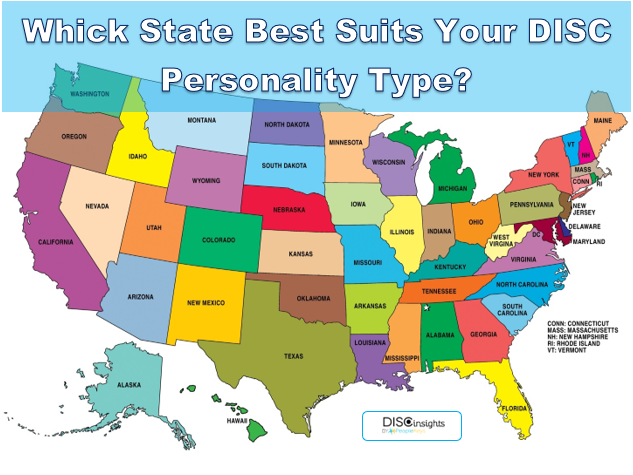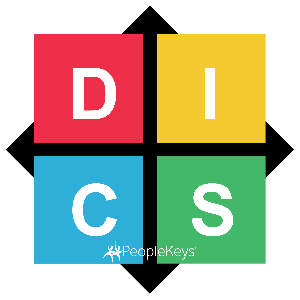- SHOP BY PRODUCT
- DISC TRAINING & CERTIFICATION TOOLS
- DISC RESOURCES
- BLOG
- SHOP BY PRODUCT
- DISC TRAINING & CERTIFICATION TOOLS
- DISC RESOURCES
- BLOG
- ALL ITEMS



Have you seen the “mood map” that’s making the rounds on the social media?
The map, released awhile ago by Time Magazine, is based on the results of a study by The Journal of Personality and Social Psychology. After analyzing data collected from over 1.6 million Americans across 13 years, the study claims to have discovered a direct link between personality and geography. The “mood map” suggests that each individual state has its own distinct personality, thus making it theoretically possible to identify the state that most closely matches your own disposition and behavior.
Here’s a summary of what they found:
When running the study, The Journal of Personality and Social Psychology didn’t use DISC as their guiding principle. Instead, they used a model commonly known as “The Big Five.” Like DISC, The Big Five acknowledges the existence of several distinct patterns of human behavior. Unlike DISC, however, The Big Five identifies (obviously) five different personality styles: Openness, Conscientiousness, Extroversion, Agreeableness, and Neuroticism. (Which can be more easily remembered using the acronym OCEAN.)
In The Big Five, people who display openness are curious and innovative. Conscientious individuals are reliable and organized. People labeled as extroverted are social and outgoing. Agreeable people are compassionate and cooperative. Lastly, those identified as neurotic are quick-tempered and prone to anxiety.
The Big Five isn’t used as often as DISC, so it’s an unusual choice for the founding principle of a major psychological study. That said, based on the theory behind The Big Five, it’s possible make the following parallels to DISC:
“Conscientiousness” = a parallel to DISC personality type C.
“Agreeable” = a parallel to DISC personality type S
“Extroverted” = a parallel to DISC personality type I
A combination of “Openness” and “Neuroticism” = DISC personality type D (The term “neuroticism,” in my opinion, is a poor word to use when diagnosing personality and patterns of human behavior because the word itself has such negative connotations. It’s important to emphasize that “neuroticism” in this context simply refers to the following traits: impatient, results-driven, and quick to anger.)
With those parallels in mind and looking at the raw data from the original study, which state in the U.S. most closely matches your DISC personality type? Here are the results:
New York and Massachusetts
Wisconsin, Washington D.C.
Utah, Tennessee
South Carolina, Georgia
Interesting, right?
Based on the vocal reaction of a significant number of users on social media, not everyone agrees with their state matches. But perhaps that comes from a possible problem in the interpretation of the study’s data?
Consider this:
Just because a state parallels your personality doesn’t necessarily mean that you would be better-suited to living there. When looking at DISC theory and patterns of human behavior, it’s often the case that people are most content when matched with personality type different from their own. For example, two I personality types might not get along because of their natural inclination to fight for the spotlight. Or two D personality types might find themselves in conflict because they both want to be in control.
With that in mind, perhaps we should be looking at complementary personality types, not exact matches. If we look at the DISC personality types that are most compatible (not most parallel), the following interpretation of the mood map data might actually provide a better gauge of where in the U.S. you’d be the happiest:
DISC Personality Type D
Nebraska and North Carolina
DISC Personality Type I
Georgia and Florida
DISC Personality Type S
Tennessee and Missouri
DISC Personality Type C
New Mexico, and Colorado
So what do you think? Look at your DISC personality type and your top state matches. Do you think the study got it right? Does it make more sense to look at states that are complementary to our personalities, not mirror images? Or is the fundamental premise of the study flawed—Is human behavior just too complex to be defined in geographical terms? We’d love to hear your opinions! Sound off in the comments below.

© PeopleKeys. All Rights Reserved
WORKING DAYS/HOURS
Mon - Fri / 8:30AM - 5:00PM EST
